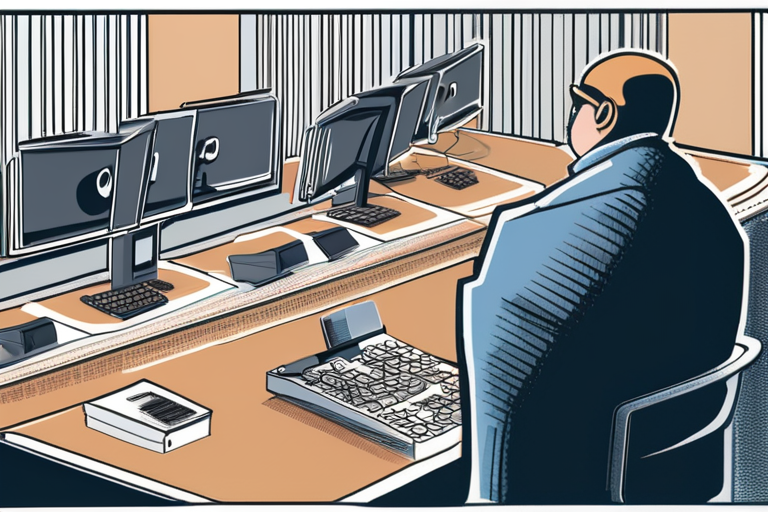The Payroll Pirate: A Global Scourge on the High Seas of Cybercrime
In a world where digital transactions are the norm, a new breed of cyber thieves has emerged to plunder the paychecks of unsuspecting employees. Meet "Payroll Pirate," a cunning scam that's been making waves globally, leaving a trail of financial devastation in its wake.
For Emily Chen, a marketing manager at a mid-sized firm in New York City, the experience was nothing short of traumatic. "I received an email from 'Workday Support' claiming I needed to update my account information," she recalls. "I thought it was legit, so I clicked on the link and entered my credentials. Next thing I knew, my direct deposit had been diverted to a fake account controlled by the scammers."
Chen's story is not an isolated incident. Microsoft has issued a warning about this active scam, which targets employees of companies that use cloud-based HR services like Workday. The attackers gain access to victims' profiles by sending phishing emails that trick recipients into providing their login credentials and multi-factor authentication (MFA) codes.
But how do these scammers pull off such a brazen heist? According to Microsoft, the attackers employ "adversary-in-the-middle" tactics, which involve sitting between the victim and the legitimate site they're trying to access. This allows them to intercept MFA codes and use them to bypass security measures.
Not all MFA is created equal, notes cybersecurity expert Dr. Lisa Nguyen, a leading authority on digital threats. "FIDO-compliant forms of MFA are immune to these types of attacks," she explains. "But many companies still rely on outdated methods that can be easily compromised."
Once inside the employees' accounts, the scammers make changes to payroll configurations within Workday. They then divert direct-deposit payments to an account controlled by the attackers, leaving victims with a financial headache.
To add insult to injury, the scammers create fake messages in Workday to block notifications that would normally alert users when their account details have been changed. "It's like they're trying to cover their tracks," says Chen, who lost several thousand dollars to the scam.
As the Payroll Pirate scam spreads globally, it's clear that no company or individual is immune to its reach. In fact, a recent survey by the Society for Human Resource Management found that 60% of companies reported experiencing some form of cyber attack in the past year alone.
So what can be done to prevent such scams? Experts recommend adopting FIDO-compliant MFA methods and implementing robust security measures within HR systems. Companies should also educate employees on phishing tactics and provide regular training on cybersecurity best practices.
For Emily Chen, the experience has been a wake-up call. "I thought I was doing everything right," she says. "But now I realize that even with the best intentions, we can all fall victim to these types of scams."
As the world grapples with the Payroll Pirate scourge, one thing is clear: vigilance and awareness are key in the fight against cybercrime.
Global Context
The Payroll Pirate scam is not an isolated incident. Cyber attacks on HR systems have been on the rise globally, with countries like India, China, and Brazil reporting significant increases in such incidents. According to a recent report by the International Association of Chiefs of Police, cybercrime has become a major concern for law enforcement agencies worldwide.
International Perspectives
In Japan, where Workday is widely used among companies, cybersecurity experts have been warning about the Payroll Pirate scam for months. "We've seen a significant increase in phishing attacks targeting HR systems," says Taro Yamada, a leading cybersecurity expert in Tokyo. "Companies need to take proactive measures to protect their employees' data."
In Europe, where GDPR regulations are strict, companies are taking a more proactive approach to cybersecurity. "We're seeing a shift towards FIDO-compliant MFA methods and robust security measures within HR systems," notes Dr. Maria Rodriguez, a cybersecurity expert in Madrid.
As the Payroll Pirate scam continues to spread globally, it's clear that no company or individual is immune to its reach. But with awareness, vigilance, and a commitment to cybersecurity best practices, we can all do our part to prevent such scams from succeeding.
*Based on reporting by Arstechnica.*



 Hoppi
Hoppi

 Hoppi
Hoppi

 Hoppi
Hoppi

 Hoppi
Hoppi

 hoppi
hoppi

 hoppi
hoppi











